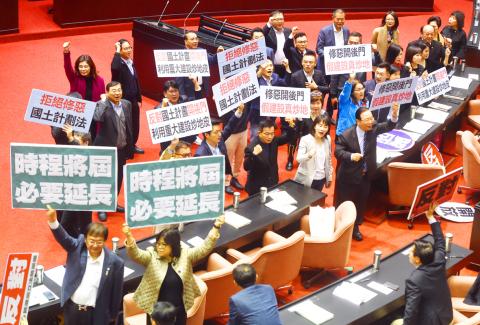Controversial amendments to the Spatial Planning Act (國土計畫法) yesterday advanced to committee review, despite a united effort by opposition parties to vote them down.
Opposition lawmakers objected to a motion tendered by the Executive Yuan that would advance the amendments it proposed last month to the Internal Administration Committee for a preliminary review.
The Chinese Nationalist Party (KMT), the Taiwan People’s Party and the New Power Party caucuses filed a countermotion to return the bill to the Procedure Committee, which was put to a vote.

Photo: Chien Jung-feng, Taipei Times
Democratic Progressive Party (DPP) Legislator Lin Shu-fen (林淑芬), who was instrumental in getting the act passed in 2015, abstained, while DPP Legislator Kao Chia-yu (高嘉瑜) voted for the motion to be stricken down.
The motion was vetoed 58-41.
DPP caucus secretary-general Chung Chia-pin (鍾佳濱) later said that Kao told him she mistakenly voted in favor of the motion.
Shortly after the draft amendments were unveiled, environmentalists called for them to be scrapped.
At the heart of the controversy are two proposals that would allow local governments to indefinitely postpone submitting regional spatial plans, and give the Executive Yuan the right to revise national or regional spatial plans to make way for “major construction projects.”
The proposed amendments have sparked concern that they could encourage excessive development at the cost of environmental protection.
DPP Legislator Kuan Bi-ling (管碧玲) said that the Executive Yuan had not attempted to “sneak in” the draft amendments amid the COVID-19 pandemic, as some people have claimed.
The bill was submitted because an April 30 deadline for the submission of regional spatial plans by local governments is approaching, and only 10 of 18 local governments who need to turn in a plan have done so, she said.
The proposals are not meant to “let local governments who have not submitted a plan off the hook,” she said.
The caucus plans to submit its version of the amendments during a committee review and set an extended deadline for local governments to submit spatial plans, instead of allowing them to procrastinate indefinitely, she said.
It would clearly define the scope of “major construction projects” approved by the Executive Yuan, and limit them to green energy, agricultural and cultural projects, she said.

Taiwan has received more than US$70 million in royalties as of the end of last year from developing the F-16V jet as countries worldwide purchase or upgrade to this popular model, government and military officials said on Saturday. Taiwan funded the development of the F-16V jet and ended up the sole investor as other countries withdrew from the program. Now the F-16V is increasingly popular and countries must pay Taiwan a percentage in royalties when they purchase new F-16V aircraft or upgrade older F-16 models. The next five years are expected to be the peak for these royalties, with Taiwan potentially earning

STAY IN YOUR LANE: As the US and Israel attack Iran, the ministry has warned China not to overstep by including Taiwanese citizens in its evacuation orders The Ministry of Foreign Affairs (MOFA) yesterday rebuked a statement by China’s embassy in Israel that it would evacuate Taiwanese holders of Chinese travel documents from Israel amid the latter’s escalating conflict with Iran. Tensions have risen across the Middle East in the wake of US and Israeli airstrikes on Iran beginning Saturday. China subsequently issued an evacuation notice for its citizens. In a news release, the Chinese embassy in Israel said holders of “Taiwan compatriot permits (台胞證)” issued to Taiwanese nationals by Chinese authorities for travel to China — could register for evacuation to Egypt. In Taipei, the ministry yesterday said Taiwan

‘LIKE-MINDED PARTNER’: Tako van Popta said it would be inappropriate to delay signing the deal with Taiwan because of China, adding he would promote the issue Canadian senators have stressed Taiwan’s importance for international trade and expressed enthusiasm for ensuring the Taiwan-Canada trade cooperation framework agreement is implemented this year. Representative to Canada Harry Tseng (曾厚仁) in an interview with the Central News Agency (CNA) said he was increasingly uneasy about Ottawa’s delays in signing the agreement, especially as Ottawa has warmed toward Beijing. There are “no negotiations left. Not only [is it] initialed, we have three versions of the text ready: English, French and Mandarin,” Tseng said. “That tells you how close we are to the final signature.” Tseng said that he hoped Canadian Prime Minister Mark Carney

POSITIVE DEVELOPMENT: Japan and the US are expected to hold in-depth discussions on Taiwan-related issues during the meeting next month, Japanese sources said The holding of a Japan-US leaders’ meeting ahead of US President Donald Trump’s visit to China is positive news for Taiwan, former Japan-Taiwan Exchange Association representative Hiroyasu Izumi said yesterday. After the Liberal Democratic Party’s landslide victory in Japan’s House of Representatives election, Japanese Prime Minister Sanae Takaichi is scheduled to visit the US next month, where she is to meet with Trump ahead of the US president’s planned visit to China from March 31 to April 2 for a meeting with Chinese President Xi Jinping (習近平). Japan and the US are expected to hold in-depth discussions on Taiwan-related issues during the